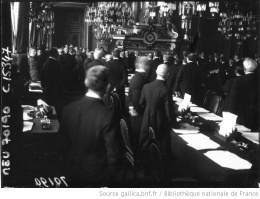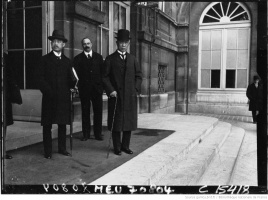Early Life↑
Prince Fumimaro Konoe (1891-1945) belonged to the highest class of Japanese nobility and was related by blood to the imperial line. His mother died several days after his birth. His father Atsumaro Konoe (1863-1904), who had studied in Germany, was a rising star in the world of politics and became the president of the House of Peers in 1896, but died prematurely at only forty years old.
After Atsumaro’s death, the Konoe family ran into financial difficulties but gained the support of the Sumitomo zaibatsu, a family-owned business conglomerate. Fumimaro Konoe studied at Kyoto Imperial University, and under the tutelage of Kawakami Hajime (1879-1946), who was inclined to Marxism, Konoe developed an interest in socialism. In 1916, at the age of twenty-five, he took over his father’s seat in the House of Peers. After graduating from university, he came under political guidance of the Elder Statesman (genrô) Prince Saionji Kinmochi (1849-1940) who included him in the Japanese delegation for the Versailles Peace Conference in 1919.
Versailles Peace Conference↑
Before leaving for Europe, Konoe published an article entitled “Rejection of a Pacifism Based on the British-American Principle” in the December 1918 issue of Nihon oyobi Nihonjin (Japan and the Japanese), a magazine with nationalistic tendencies. He warned of excessive enthusiasm for democracy and pacifism which was taking the world – including Japan – by storm. In his opinion, the first global war, which had just ended, had been a struggle between powers who benefitted from the status quo against other nations who had been interested in changing it. It had nothing to do with “good” and “bad”. He maintained that pacifism was inappropriate if it served to maintain the political and economic power relations in the world. Conversely, turning to war was not necessarily immoral if it was the only way to do away with international injustice. He felt that the nascent League of Nations would be nothing more than an instrument to strengthen the rule of Western colonial powers over coloured races. He found it unfortunate that Japan was obediently accepting the peace order propagated by the United States and England, as well as the idea of the League of Nations and of democracy. Despite being a latecomer as a nation, like Germany, and thus lacking the chance to expand, he thought Japan should be interested in the destruction of the status quo so that one day it could be forced to use military means.[1] That the Versailles Conference rejected Japan’s proposal to declare racial equality only cemented Konoe’s views.[2]
Later Career↑
However, Fumimaro Konoe’s opinions were diametrically opposed to the official Japanese policy at the time, including Saionji’s policy of close cooperation with the Anglo-Saxon powers. Later, in 1933, Konoe would become president of the House of Peers, chairman of the Privy Council in 1939 and prime minister three times between 1937 and 1941. During Konoe’s first cabinet, Japan instigated a war against China and, when it appeared they could not win a quick victory, Konoe announced the creation of a new order in East Asia (Tôa shinchitsujo) in November 1938. This was to be free of Western influence and, although its official guiding principle was creation of a just world order, ultimately would bring about Japanese supremacy over China. At the same time a movement for a new order (shintaisei) within Japan developed, calling for the dissolution of all current political parties and, instead, the creation of one single party under Konoe. The three main groups that actively supported this idea were: The socialists, who had become increasingly nationally inclined in their thinking as a result of the war with China; the leaders of the conservative parties; and those on the extreme right. On 1 August 1940, Foreign Minister Matsuoka Yōsuke announced the idea to create a Greater East Asia Co-Prosperity Sphere (Dai Tōa Kyōeiken), which would have put not only China but all of South East Asia under Japanese control, ending the colonial rule of the Western powers. The concept of this co-prosperity sphere was defined as an Asian Monroe Doctrine.
On 27 September 1940, Japan concluded the Tripartite Pact with Germany and Italy, aimed at neutralising the United States. The declared intention of the pact was the creation of a new and just international world order, which would have brought Asia under Japanese control and Europe under German-Italian domination. Several days later all political parties in Japan were dissolved, replaced by a single organisation called Taisei Yokusankai (Imperial Rule Assistance Association) and put under the chairmanship of the prime minister who, at that time, was Fumimaro Konoe.
When Japan occupied the southern part of French Indochina in July 1941 – the north having already been occupied since September 1940 – the United States and other Western countries imposed an economic embargo. The end of oil deliveries hurt the most. On 3 September 1940 the Liaison Conference (renraku kaigi), consisting of the most important ministers of Konoe’s third cabinet and the high command, decided that Japan should open war against the Anglo-Saxon powers if the diplomatic negotiations being held in Washington did not succeed by the end of October. This decision was sanctioned on 6 September by an Imperial Conference (gozen kaigi) under the official chairmanship of the tenno.[3] Although Konoe regretted the development, because the decision was officially made by the emperor it could not be revoked. Therefore, Konoe resigned in order to make space for a new cabinet that was not already bound to the former, now sanctioned, decision. The new prime minister became General Tōjō Hideki (1884-1948) who continued the Washington negotiations, however, when no results were reached, he renewed the war decision on 1 December. One week later, Japan opened war against the Anglo-Saxon powers, calling it the Greater East Asia War (Dai Tō-A Sensō) and thereby claiming that it was a war to liberate Asia.
Konoe struggled during the war years to find a strategy that would create peace with the enemy powers, however this was in vain. In December 1945 he committed suicide to avoid arrest after he was pronounced a suspected war criminal by the International Military Tribunal for the Far East.
Gerhard Krebs, Independent Scholar
Reviewed by external referees on behalf of the General Editors
Notes
- ↑ Konoe, Fumimaro: Ei-Bei hon'i no heiwashugi o haisu [Rejection of a Pacifism Based on the British-American Principle], in: Konoe, Fumimaro: Seidanroku [Youth Publications], Tokyo 1936, pp. 231-241. Shortened English version in Saaler, Sven / Szpilman, Christopher W. A.: Pan-Asianism. A Documentary History, volume 1, Lanham 2011, pp. 311-317.
- ↑ Konoe, Fumimaro: Kôwakaigi shokan [Impression of the Peace Conference], in: Seidanroku 1936, pp. 97-115.
- ↑ Krebs, Gerhard: Japan im Pazifischen Krieg. Herrschaftssystem, politische Willensbildung und Friedenssuche, Munich 2010, pp. 100-106.
Selected Bibliography
- Berger, Gordon Mark: Parties Out of Power in Japan, 1931-1941, Princeton 1977: Princeton University Press.
- Berger, Gordon Mark: Japan's Young Prince. Konoe Fumimaro's Early Political Career, 1916-1931, in: Monumenta Nipponica 29/4, 1974, pp. 451-475, doi:10.2307/2383896.
- Bernstein, Gail Lee: Japanese Marxist: a portrait of Kawakami Hajime, 1879-1946, Harvard East Asian series, Cambridge 1976: Harvard University Press.
- Konoe, Fumimaro: Konoe-kô Seidanroku [Youth Publications], Tokyo 1936: Shōwa 12.
- Oka, Yoshitake: Konoe Fumimaro: A Political Biography, Tokyo 1983.









